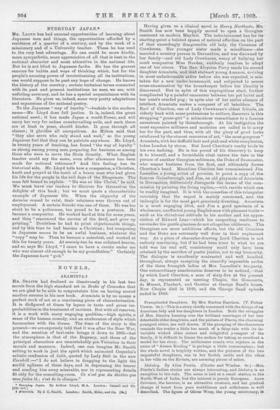. EVERYDAY JAPAN.* Mn. LLOYD has had unusual opportunities of
learning about Japanese men and things, the opportunities afforded by a residence of a quarter of a century, and by the work of a missionary and of a University teacher. These he has used to the very best advantage. No one could be more kindly, more sympathetic, more appreciative of all that is best in the national character and most attractive in the national life. But he is not blind to Japanese faults. He has the gravest censure for habits and ways of thinking which, but for the people's amazing power of revolutionising all its institutions, one would suppose to be past any hope of change. He knows the history of the country ; certain technical terms connected with its past and present institutions he uses, we see, with unfailing accuracy, and he has a special acquaintance with its literature. He gives us, indeed, some very pretty adaptations and expansions of the national poetry.
To the Japanese "way of loyalty "—bushido is the modern name—Mr. Lloyd does full justice. It is, indeed, the great national asset ; it has made Japan a world-Power, and will carry her very far unless countervailing evils, and such there are at least in posse, should hinder. It goes through all classes ; it glorifies all occupations. As Milton said that "they also serve who only stand and wait," so the young Japanese feel that they can be patriots anywhere. Mr. Lloyd, in twenty years of teaching, has found "the way of loyalty" as strong among young men preparing for business as among those who were to serve the State directly. What English teacher could say the same, even after allowance has been made for national reticence ? And this feeling has its historical side. Mr. Lloyd tells how a companion, a Christian, knelt and prayed at the tomb of a brave man who bad given his life for the people in the evil days of the Shogunate. The man felt bound to explain. "lie was so like Christ," be said. We must leave our readers to discover for themselves the delights of this book ; but we must quote a characteristic example of Japanese life. When the oligarchy of the dainvfos ceased to exist, their retainers were thrown out of employment. A certain Suzuki was one of them. He was too short to be a policeman, too proud to be a postman. He became a compositor. He worked hard at this for some years, and then "renounced the service of the devil, and gave up printing." Doubtless he had to print objectionable things, and by this time he had become a Christian ; but composing in Japanese seems to be an awful business, whatever the " copy " may be. Then he became a catechist, and worked at this for twenty years. At seventy-two he was ordained deacon, and so, says Mr. Lloyd, "I came to have a curate under me who was almost old enough to be my grandfather." Certainly the Japanese have "grit."










































 Previous page
Previous page